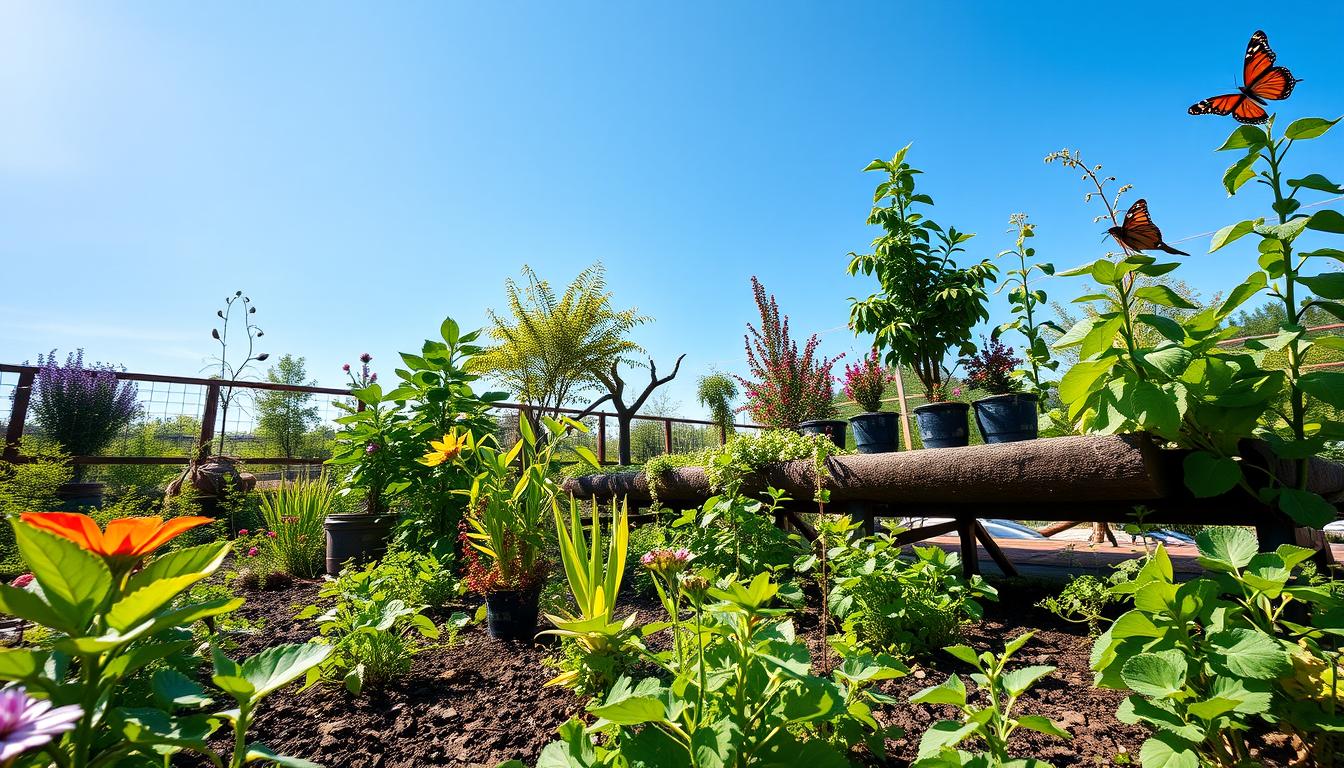I’m excited to share the benefits of permaculture gardening with you. It’s a green way to garden that’s good for the planet. It helps reduce harm to the environment and supports many different species.
Permaculture gardening is all about making a garden that takes care of itself. It’s a great way to improve soil and grow more food. It’s perfect for gardeners of all levels and shows us how to garden in a sustainable way.
Exploring permaculture gardening has taught me a lot. It’s changing the way gardeners think about gardening. I’m excited to share what I’ve learned with you and explore the many benefits of permaculture gardening.
Understanding Permaculture Gardening Basics
Exploring permaculture gardening is exciting. It’s a system that makes gardens sustainable and regenerative. It offers many benefits for organic gardening and eco-friendly gardening.
Permaculture gardening basics start with key principles. These include working with nature, reducing waste, and boosting biodiversity. By following these, gardeners can build a balanced ecosystem. This ecosystem is full of life and requires little outside help.
What Is Permaculture?
Permaculture gardening is a holistic method. It looks at the whole ecosystem, from soil to plants and animals. It aims to create harmony between humans and nature.
Key Principles of Permaculture
Permaculture has several important principles. These are:
- Working with nature, rather than against it
- Minimizing waste and reducing external inputs
- Promoting biodiversity and ecosystem services
- Creating a balanced and resilient ecosystem
By sticking to these principles, gardeners can make a sustainable garden. This garden will be full of life and offer many benefits for organic and eco-friendly gardening.
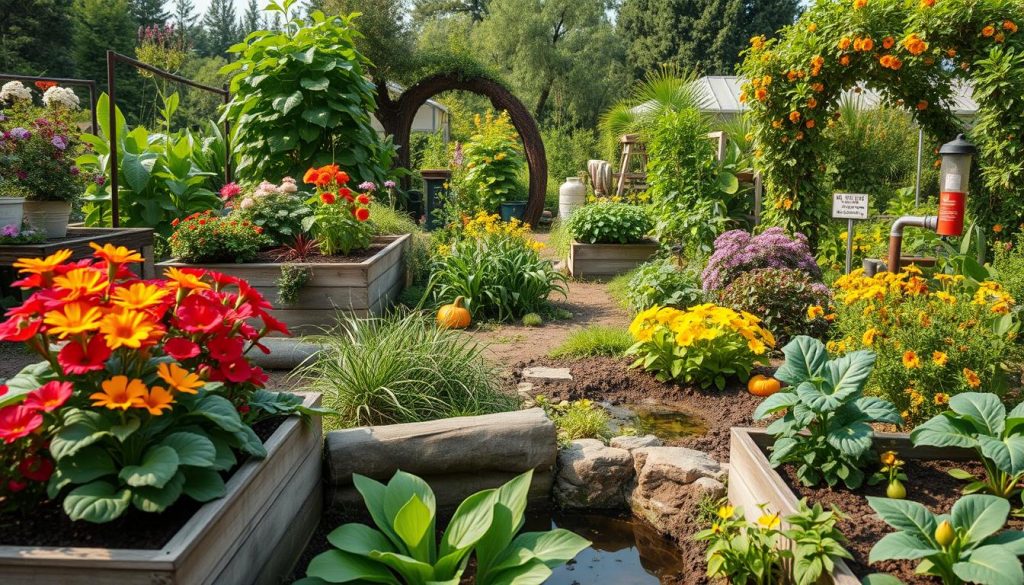
Environmental Benefits of Permaculture Gardening
Exploring permaculture gardening, I see many environmental benefits. It creates a sustainable ecosystem that boosts biodiversity and soil health. It also cuts down on waste and uses less water and chemicals.
Key benefits include:
- Promoting biodiversity by creating a habitat for various plants and animals
- Enhancing soil health through the use of natural amendments and conservation tillage
- Reducing environmental footprint by minimizing waste and using renewable resources
Permaculture gardening helps fight climate change and makes our planet healthier. It offers many benefits, leading to a better future for all.
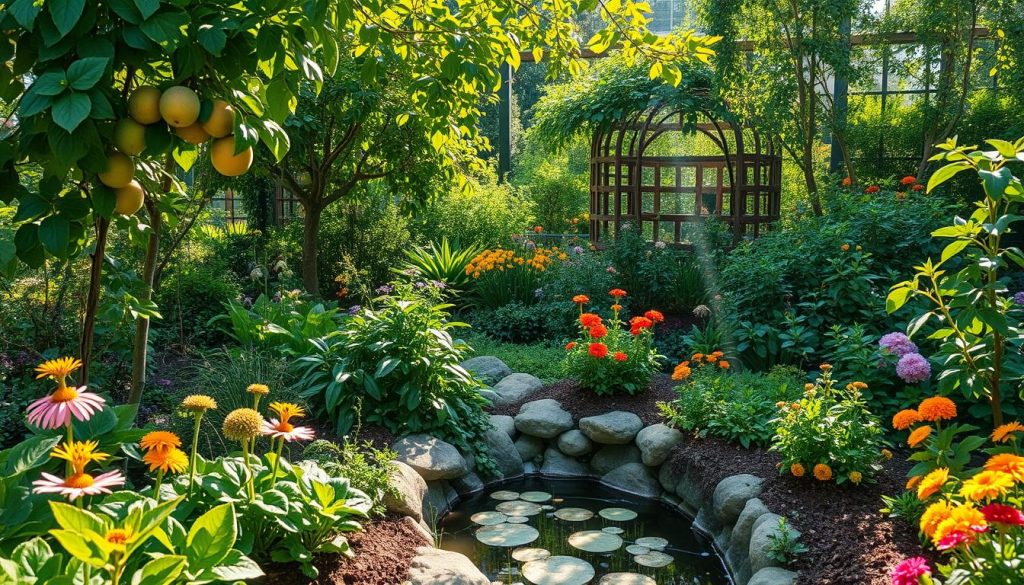
| Environmental Benefits | Description |
|---|---|
| Promotes Biodiversity | Creates a habitat for various plants and animals |
| Enhances Soil Health | Uses natural amendments and conservation tillage |
| Reduces Environmental Footprint | Minimizes waste and uses renewable resources |
Economic Advantages of Permaculture Gardening
Exploring permaculture gardening, I find it offers great economic benefits. It helps gardeners use fewer external inputs like synthetic fertilizers and pesticides. This leads to better crop yields and healthier soil, showing the power of regenerative agriculture.
Some key economic benefits of permaculture gardening are:
- Reduced gardening costs: Using natural and local materials saves money.
- Increased yield efficiency: Better use of resources means more crops and productivity.
- Improved soil health: Techniques like mulching and composting reduce the need for harmful chemicals.
Permaculture gardening also brings health benefits, like fresh produce and exercise. As I learn more, I’m excited to see how it helps the environment and our health.
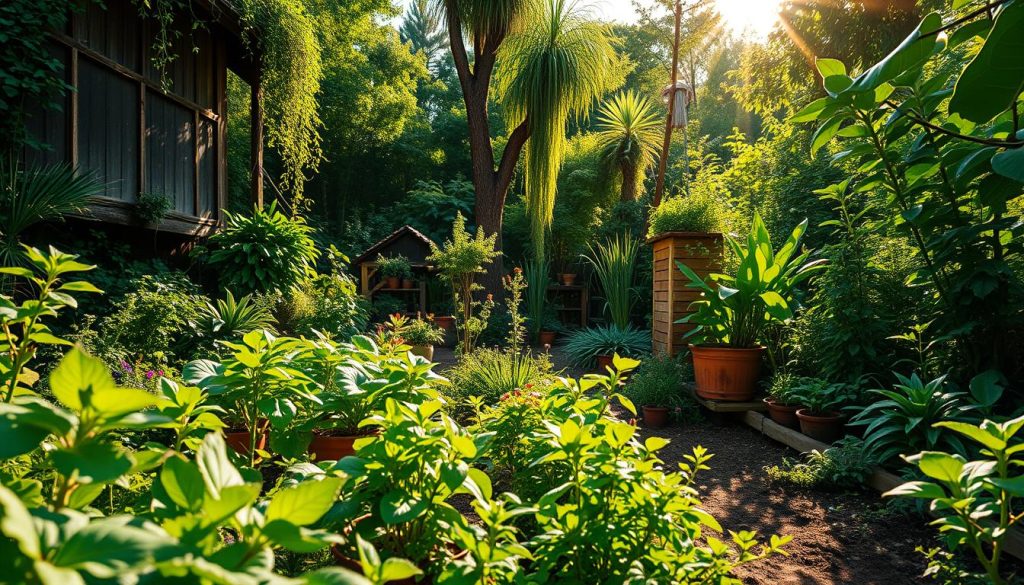
Lowers Gardening Costs
One big advantage of permaculture gardening is saving money. Gardeners use natural and local materials, cutting down on costs for synthetic fertilizers and pesticides.
Increases Yield Efficiency
Permaculture gardening also makes better use of resources. This leads to more crops and better productivity. It helps gardeners reduce waste and improve their overall output.
| Benefits | Description |
|---|---|
| Regenerative agriculture benefits | Improved soil health, increased crop yields, and reduced environmental impact |
| Health benefits of gardening | Access to fresh produce, opportunities for physical activity, and reduced stress |
Social Impacts of Permaculture Gardening
Exploring permaculture gardening, I’ve seen its effects go beyond the environment and economy. It deeply impacts our communities, bringing people together. By using permaculture, gardeners help build a better future for all, promoting teamwork and green living.
The social benefits of permaculture gardening are huge. It changes how we interact with each other in many ways. Here are some key points:
- Building community connections through shared gardening experiences and cooperative efforts
- Encouraging sustainable practices and a shared sense of responsibility for the environment
- Fostering a sense of belonging and cooperation among community members
By adopting permaculture, we join a movement focused on sustainability and community. Together, we can make our environments better. This leads to healthier soil, more food, and a variety of plants. 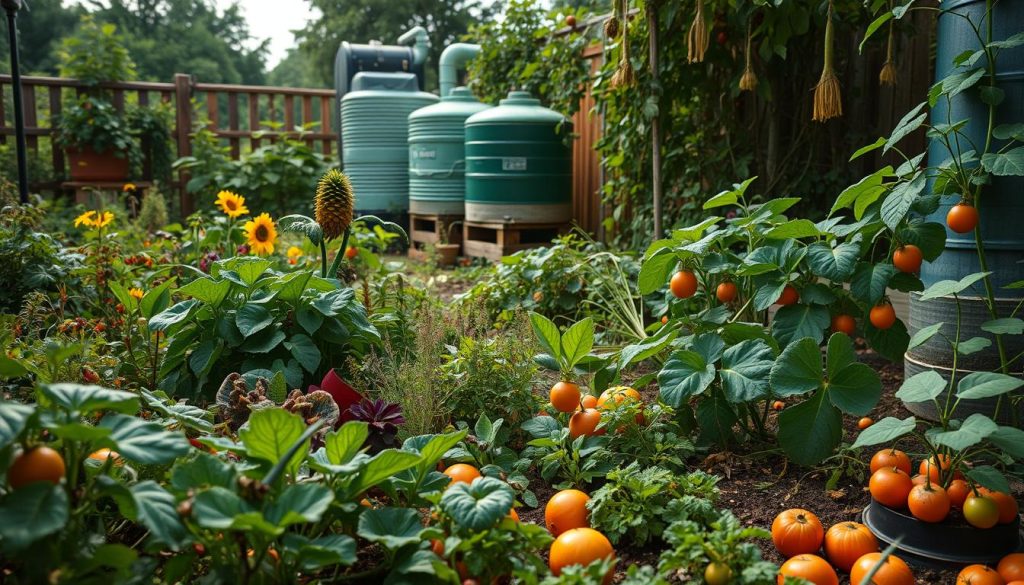
Health Benefits of Permaculture Gardening
Exploring permaculture gardening opens up a world of health benefits. It lets us grow our own food, making our diet healthier and more balanced. It also gets us moving, making our lives more active and engaging.
Some key health perks of permaculture gardening are:
- Access to fresh, organic produce, rich in essential nutrients and vitamins
- Increased physical activity, reducing the risk of chronic diseases and improving overall well-being
- Reduced exposure to pesticides and other harmful chemicals, often found in conventionally grown produce
By choosing organic gardening, we can greatly improve our health and well-being. Remember, permaculture gardening is good for us and the planet.
In conclusion, permaculture gardening is a chance to live healthier while helping the environment. By using sustainable gardening practices and organic gardening benefits, we can build a better world for ourselves and future generations.
| Health Benefits | Environmental Benefits |
|---|---|
| Access to fresh produce | Promotes biodiversity |
| Encourages physical activity | Reduces environmental footprint |
| Reduced exposure to pesticides | Enhances soil health |
Permaculture Gardening Techniques to Implement
Exploring permaculture gardening, I’ve learned its value in creating a sustainable ecosystem. By using these techniques, gardeners can make their gardens healthier and more productive. This leads to a better environment.
Companion Planting
Companion planting pairs plants to boost their growth and health. It helps fight pests and diseases and improves soil quality.
Mulching Strategies
Mulching is key in permaculture gardening. It keeps soil moist, stops weeds, and controls soil temperature. Organic mulch makes the garden more sustainable and regenerative.
Water Management
Good water management is vital in permaculture gardening. It saves water and cuts down waste. Using efficient irrigation and rainwater harvesting reduces environmental impact.
| Technique | Description | Benefits |
|---|---|---|
| Companion Planting | Pairing plants to enhance growth and health | Reduces pests and diseases, improves soil quality |
| Mulching Strategies | Using organic mulch to retain soil moisture and suppress weeds | Regulates soil temperature, creates a sustainable ecosystem |
| Water Management | Implementing efficient irrigation systems and harvesting rainwater | Conserves water, reduces waste, promotes eco-friendly gardening advantages |
Overcoming Challenges in Permaculture Gardening
Permaculture gardening comes with its own set of challenges. One big one is fighting pests without using harmful chemicals. By using companion planting and crop rotation, I can keep pests away.
Climate change also poses a challenge with its unpredictable weather and extreme temperatures. But, regenerative agriculture helps. It teaches me how to save soil and manage water better. This makes my garden more resilient.
Here are some ways to tackle these challenges:
- Using natural pest control methods, such as introducing beneficial insects or using physical barriers
- Implementing climate-resilient gardening techniques, such as mulching and cover cropping
- Creating a diverse and polyculture garden, which can help to reduce the risk of disease and pest outbreaks
By following permaculture and regenerative agriculture, I can beat the gardening challenges. My garden will flourish, giving me fresh food and helping the environment.
| Challenge | Solution |
|---|---|
| Pest infestations | Companion planting, crop rotation, and natural pest control methods |
| Climate change | Regenerative agriculture benefits, such as soil conservation and efficient water management |
Personal Growth Through Permaculture Gardening
Exploring permaculture gardening has shown me its many personal benefits. It goes beyond just the health perks of gardening. By using permaculture design, I’ve grown to understand nature better. This has led to a more connected and fulfilling life.
Key benefits of permaculture gardening for personal growth include:
- Enhancing gardening skills through hands-on experience and experimentation
- Developing patience and resilience in the face of challenges and setbacks
- Cultivating a sense of community and connection with like-minded individuals
Permaculture gardening has turned my garden into a place of fresh produce and peace. It’s a space for relaxation and self-reflection. The health benefits and personal growth make it a life-changing experience.
I’m eager to see more personal growth through permaculture gardening. Whether you’re new or experienced, I invite you to try it. Discover the many benefits it offers.
Getting Started with Your Own Permaculture Garden
Permaculture gardening is a sustainable way to create a better future. It helps us grow food and care for our planet. By using permaculture, we can make our gardens healthy and productive.
Starting or growing your permaculture garden is easy with the right tools. This article has everything you need to plan and start. You’ll see how permaculture can change your life and the planet.
Permaculture gardening does more than just grow food. It teaches us to respect nature and build community. Let’s start this journey together, making a better world, one garden at a time.

